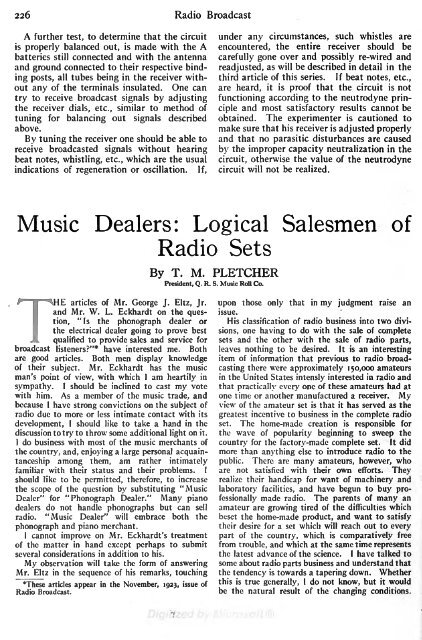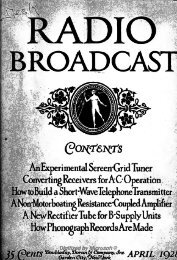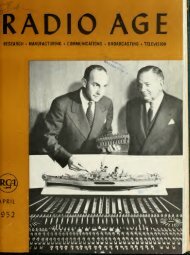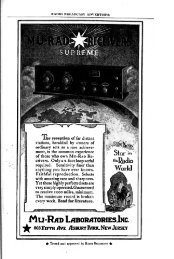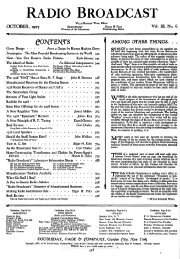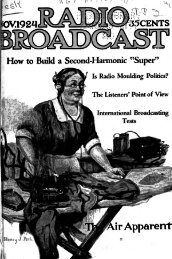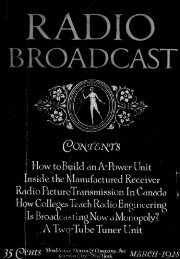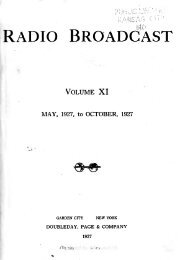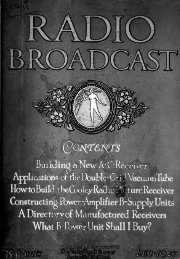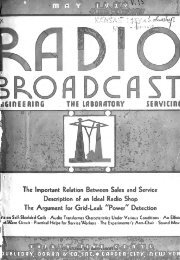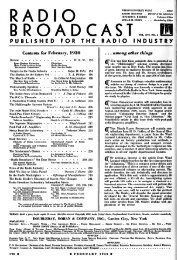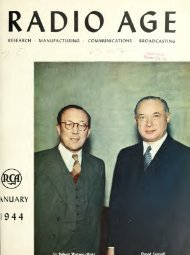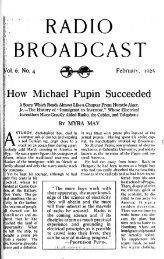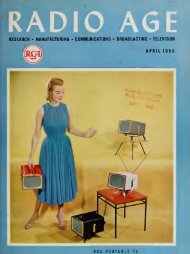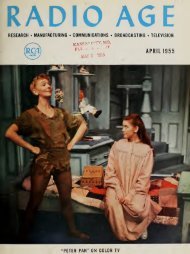226 <strong>Radio</strong> <strong>Broadcast</strong>A further test,to determine that the circuitis properly balanced out, is made with the Abatteries still connected and with the antennaand ground connected to their respective bindingposts, all tubes being in the receiver withoutany of the terminals insulated. One cantry to receive broadcast signals by adjustingthe receiver dials, etc., similar to method oftuning for balancing out signals describedabove.By tuning the receiver one should be able toreceive broadcasted signals without hearingbeat notes, whistling, etc., which are the usualindications of regeneration or oscillation. If,under any circumstances, such whistles areencountered, the entire receiver should becarefully gone over and possibly re-wired andreadjusted, as will be described in detail in thethird article of this series. If beat notes, etc.,are heard, it is proof that the circuit is notfunctioning according to the neutrodyne principleand most satisfactory results cannot beobtained. The experimenter is cautioned tomake sure that his receiver is adjusted properlyand that no parasitic disturbances are causedby the improper capacity neutralization in thecircuit, otherwise the value of the neutrodynecircuit will not be realized.Music Dealers: Logical Salesmen of<strong>Radio</strong> SetsBy T.M. FLETCHERPresident, Q. R. S. Music Roll Co.t m ^VHE articles of Mr. George J. Eltz, Jr.and Mr. W. L. Eckhardt on the question,"Is the phonograph dealer orthe electrical dealer going to prove bestM. qualified to provide sales and service forbroadcast listeners?"* have interested me. Bothare good articles. Both men display knowledgeof their subject. Mr. Eckhardt has the musicman's point of view, with which I am heartily inIsympathy. should be inclined to cast my votewith him. As a member of the music trade, andbecause I have strong convictions on the subject ofradio due to more or less intimate contact with itsdevelopment,I should like to take a hand in thediscussion to try to throw some additional light on it.I do business with most of the music merchants ofthe country, and, enjoying a large personal acquaintanceshipamong them, am rather intimatelyfamiliar with their status and their Iproblems.should like to be permitted, therefore, to increasethe scope of the question by substituting "MusicDealer" for "Phonograph Dealer." Many pianodealers do not handle phonographs but can sellradio. "Music Dealer" will embrace both thephonograph and piano merchant.I cannot improve on Mr. Eckhardt's treatmentof the matter in hand except perhaps to submitseveral considerations in addition to his.My observation will take the form of answeringMr. Eltz in the sequence of his remarks, touching*These articles appear in the November, 1923, issue of<strong>Radio</strong> <strong>Broadcast</strong>.upon those only that in my judgment raise anissue.His classification of radio business into two divisions,one having to do with the sale of completesets and the other with the sale of radio parts,leaves nothing to be desired. It is an interestingitem of information that previous to radio broadcastingthere were approximately 150,000 amateursin the United States intensly interested in radio andthat practically every one of these amateurs had atone time or another manufactured a receiver. Myview of the amateur set is that it has served as thegreatest incentive to business in the complete radioset. The home-made creation is responsible forthe wave of popularity beginning to sweep thecountry for the factory-made complete set. It didmore than anything else to introduce radio to thepublic. There are many amateurs, however, whoare not satisfied with their own efforts. Theyrealize their handicap for want of machinery andlaboratory facilities, and have begun to buy professionallymade radio. The parents of many anamateur are growing tired of the difficulties whichbeset the home-made product, and want to satisfytheir desire for a set which will reach out to everypart of the country, which is comparatively freefrom trouble, and which at the same time representsthe latest advance of the science. I have talked tosome about radio parts business and understand thatthe tendency is towards a tapering down. Whetherthis is true generally,I do not know, but it wouldbe the natural result of the changing conditions.
Music Dealers: Logical Salesmen of <strong>Radio</strong> Sets 227Here is the common-sense aspect ^l the case: thedealer in radio will of course follow tne lines of leastresistance. Complete radio sets offer more profit,less trouble, less stock investment than radio parts.The reasonable tendency will be towards the completesets.have had their fling atAdd to this the fact that so many boys"rolling'their own" and arewilling to acknowledge that without factory facilitiesthey are at a disadvantage,it would seem entirelyprobable that the parts business has seen itsbest days and that it is now on the downwardswing.I am basing my hypothesison purely psychological grounds.PLENTY OF TECHNICAL MEN AVAILABLE TOTHE MUSIC DEALERdistinctions which the writer makes"IpHE* between the phonograph and radio aretheoretical rather than practical.Iagreethat the radio set is more complex, that itpresents greater mechanical difficultiesand more or less of a problem in both theinstallation and operation. All this, however,is not in a degree to require a man of anymore training than is needed to install or repaira talking machine or tune a piano. A talkingmachinedepartment cannot be without a practicalman. A piano department cannot be without apractical man. The radio department can as littleas these afford to be without someone capable of takingcare of the difficulties arising on the mechanicalside. The radio man does not require four years ofcollege, a post-graduate course and a long apprenticeshipany more than the music-merchant's repair manor the piano tuner. As a matter of fact, the degreeof expertness of the radio man is not nearly as highas that of the tuner, and what is more, a radio manIn "Why the Electrical Dealer is theis easier to get.Proper Outlet for <strong>Radio</strong>" the statement is made thateven before broadcasting there were 150,000 amateursin the country. There are not anything like 15,000piano tuners nor 15,000 talking-machine repair men.The ratio is 10 to i in favor of the radio man.The author of the article in question makes extendedconsideration of the question. Which classof merchant serving the public at the present timeis best fitted to carry on the sale of radio? Hementions five classes of channels through whichradio purchases can be made: the hardware dealer,department store, phonograph dealer, electricaldealer, and special radio store.His first objection to the music dealer successfullyhandling radio is: "The personnel employed byphonograph dealers is not trained in the particularway necessary for the sale of radio equipment." Heis right in saying that the personnel is not yet trainedin radio, but my contention is that some of thesuccesses made by music stores handling radio showthat the music men learn very quickly and thatcompetent radio help is easy to get.He mentions, "The average phonograph dealeror phonograph salesman is in every sense of the worda salesman." There he hit the bull's-eye. That isone of the biggest arguments in favor of the musicman handling radio. He will succeed with radiobecause he is a salesman. Development of thebusiness depends more on selling than technicalability. Arrange the business so that each mancan function at his best. Here is the plan:A radio department, whether it is part of anelectrical business or part of a music business,should be complete in itself irrespectiveof the size of the general business.The music dealer in the small town shouldhave a radio department just as clearly definedas his piano and talking-machine departments.Whenever you find a store withdifferent commodities jumbled togetherwithout distinct departments, you will seean unprogressive establishment. Pianosneed at least one salesman and a practicalman. Which is true also of talking machines.No reason why the radio departmentshould not be equally well manned. Howmany successful automobile men are there whohappen to be combination salesmen and practicalmen? Let the salesman sell radio, and let someoneelse do the installing and the repair work.ADDITIONAL EXPENSES OF A RADIO DEPARTMENTJUSTIFIEDELTZ. contends that the establishmentMR. of a radio department "is an additional expensewhich will naturally reflect itself either in anincreased price of material to customers, or in decreasedprofit." But can you imagine how muchbusiness a man would do in complete sets by simplystocking them and having someone with a thousandand-oneduties incident to the electrical business,merely attempt to sell radio as a side-line to hisregular activitites? Selling cost in such case wouldbe little, of course, but there would be little or nobusiness. On the other hand, a man devoting allof his time to radio, and being paid for what heaccomplished in radio, would have to sell a certainquantity of sets each week to earn a living, andcorrespondingly more to earn an attractive income.There can be no question of outlay when there isenough business to justify the expense. And certainlythe most economical way, no matter whohandles radio, is to have a separate and distinctdepartment with competent help at least onesalesman and a handy man.The author talks about the needless "additionalexpense of establishing a radio department", yethe also recommends that the radio dealer "installa special department in which the more profitablelines of electrical merchandise, other than radio,are sold." Because of his unfamiliarity with themusic business, he evidently does not see the analogy


